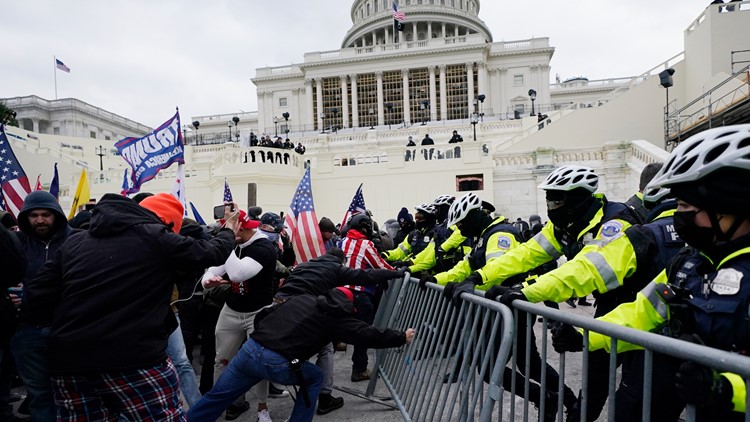WASHINGTON — In a 6-3 vote Friday, the U.S. Supreme Court upheld a lower court judge's decision to dismiss an obstruction charge filed in more than 300 Jan. 6 cases, saying the government had taken an overly broad reading of the statute.
Writing for the majority in the case, titled Joseph Fischer v. United States, Chief Justice John Roberts said the Justice Department had overstepped in its interpretation of a post-Enron law — 18 U.S.C. § 1512(c)(2) — about obstructing an official proceeding. In his opinion, Roberts said the government must establish the defendant "impaired the availability or integrity for use in an official proceeding of records, documents, objects, or... other things used in the proceeding, or attempted to do so."
Roberts, who was joined in the majority by an ideological mix of Justices Clarence Thomas, Samuel Alito, Neil Gorsuch, Brett Kavanaugh and Ketanji Brown Jackson, said the government's more expansive reading of the statute would criminalize a "broad swath of prosaic conduct," including that routinely performed by activists and lobbyists.
"Nothing in the text or statutory history suggests that subsection (c)(2) is designed to impose up to 20 years’ imprisonment on essentially all defendants who commit obstruction of justice in any way and who might be subject to lesser penalties under more specific obstruction statutes," Roberts wrote.
At issue was the meaning of the word “otherwise” in 18 U.S.C. § 1512(c)(2):
(c)Whoever corruptly—
(1) alters, destroys, mutilates, or conceals a record, document, or other object, or attempts to do so, with the intent to impair the object’s integrity or availability for use in an official proceeding; or
(2) otherwise obstructs, influences, or impedes any official proceeding, or attempts to do so,
shall be fined under this title or imprisoned not more than 20 years, or both.
Congress created the law in 2002 to close a loophole that helped Enron’s auditing firm, Arthur Andersen, evade charges for destroying potentially incriminating documents. Despite the court's ruling Friday, Justice Jackson, who was nominated to the Supreme Court by President Joe Biden, said the statute could potentially still apply to Jan. 6 cases.
"That official proceeding plainly used certain records, documents, or objects—including, among others, those relating to the electoral votes themselves," Jackson wrote in a concurring opinion. "And it might well be that Fischer’s conduct, as alleged here, involved the impairment (or the attempted impairment) of the availability or integrity of things used during the January 6 proceeding “in ways other than those specified in (c)(1).”
In the short term, the court's decision sends the case back to the D.C. Circuit, where a panel of three judges will have to decide whether the appellant, former Pennsylvania police officer Joseph W. Fischer, committed any conduct that impaired the availability or integrity of a record or document on Jan. 6. Fischer was charged in February 2021 with multiple felony counts for allegedly charging a police line inside the Capitol. If the D.C. Circuit now upholds a district judge's decision to dismiss the obstruction count, he will still face felony charges of civil disorder and assaulting, resisting or impeding police.
In the long term, Friday's ruling means the DOJ will likely have to decide whether to return to a federal grand jury to seek re-indictment in more than 200 pending cases where the obstruction statute is charged. In a statement Friday, Attorney General Merrick Garland said the DOJ would continue to use "all available tools" to hold participants in the Jan. 6 attack accountable.
"January 6 was an unprecedented attack on the cornerstone of our system of government -- the peaceful transfer of power from one administration to the next," Garland said in a statement. "I am disappointed by today's decision, which limits an important federal statute that the Department has sought to use to ensure that those most responsible for that attack face appropriate consequences."
According to the U.S. Attorney's Office for the District of Columbia, there are currently no cases awaiting trial where obstruction of an official proceeding is the only felony charged.
It remained less clear what would happen to the "narrow band" of cases, as the U.S. Attorney's Office described it, where defendants pleaded guilty to 1512(c)(2) as their only felony count. The standard plea agreement offered in those cases required defendants to waive their rights to appeal the conviction on any basis, including that "(1) the statutes(s) to which your client is pleading guilty is unconstitutional, and (2) the admitted conduct does not fall within the scope of the statute(s)." The plea language also states that, in the case a conviction was overturned, the defendants agreed they could be re-prosecuted even for offenses where the statute of limitations had since expired.
Nearly 1,500 people have now been charged in connection with the Capitol riot, including more than 330 have charged with 18 U.S.C. § 1512(c)(2). Of those, more than 150 have already been sentenced – including former Proud Boys national chairman Enrique Tarrio, who received 22 years in prison, and Oath Keepers founder Stewart Rhodes, who received 18 years.
In March, the D.C. Circuit ruled that two sentencing enhancements were improperly used in cases involving the obstruction charge. Dozens of defendants have since sought resentencing or release from prison while they appeal, although those requests have met with mixed success.



